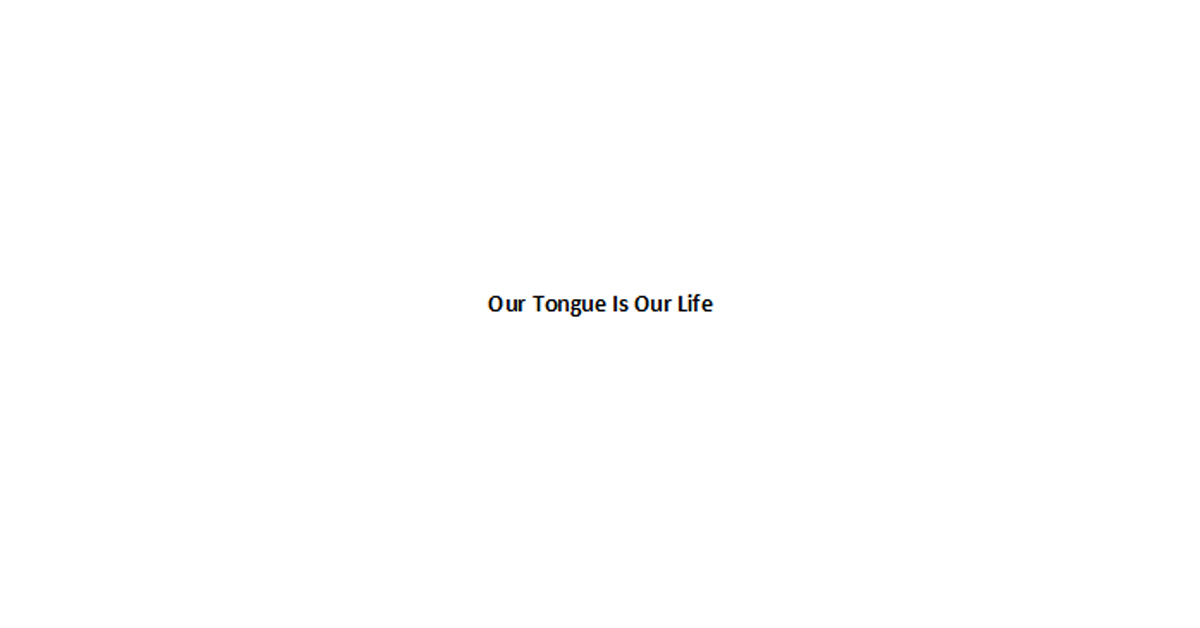
Our Tongue Is Our Life
“พูดดีเป็นศรีแก่ตัว พูดชั่วพาตัวมัวหมอง” (Pood-dee-phen-sri-kae-tau Pood-chua-pha-tua-mua-mong) is a Thai proverb which can be translated as “a good speech brings about glory to oneself while the bad one ruins our reputation.” This proverb, when sincerely adopted to life, can lead us to reach our respective destiny. Our tongue works like a life compass; we can go right or wrong in life largely depends on how we use our tongue in speech. Following are some tips for us to consider, or reconsider, how to use our tongue wisely and in such a way that we can reap the sweet fruit of righteousness.
Firstly, always remind ourselves that we live in the present (not in the past or the future). We should therefore pay more attention to what we are dealing with in the present time. This is easily said than done. It is still common to see ourselves and other people around us spend time dwelling in the past and/or the future too much until we forget to appreciate the beauty of the present moment life has to offer. To many of us, the past exists mainly for complaints and the future for worries and anxieties. Of course, there were many good things and many supportive people we met in the past. But what many of us often do is talking more about the past in a negative way. We keep complaining about what did not work in the past, and that makes us frustrated in the present. As far as the future is concerned, we tend to talk more about the impending or foreboding risks and uncertainties. That leads us to frustration and/or agitation, resulting in planning after planning. Seen in this light, the past and the future are peace stealers and we must guard against our tongue not to stress too much on them if we believe that life has far better things to give us at the present time than complaints, anxieties, and frustration of the past and the future.
Secondly, try not to use our tongue to produce words that mainly describe unpleasant situations. On the contrary, always train ourselves to use our words to change the situations. As there are two sides of a coin, the pros and cons, it is wise to learn how to see the brighter sides of things, situations, and people around us instead of complaining about them. We are to talk about the benefit of; for example, losing a lover who walked away for someone else. Stop complaining about how much we cared for him/her and why he/she cruelly betrayed our love, as faithful as it could be. Stop talking about all the gifts we gave to him/her, and the sadness and severe heartbreak we get in return. It does not make sense for any one of us to spending time talking or complaining about someone who has left us this way. It only ruins our self-esteem and self-worth. A better way to do is to talk about the beauty of losing that “unfaithful” and “hard-hearted” person instead. Again, we need to use our tongue to utter words that change the situation rather than to complain about it. We do not lose a lover, but a mere heartbreaker. How could we meet a new and more loveable lover without that loss? As wise men say, “When one door closes, another opens.” This profound truth magically shifts us from the once dirty mud of complaints to the now exultation of life.
Finally, our tongue is, by means of comparison, a rudder blade of a ship that propels the ship forwards. If controlled well enough, both our tongue and the rudder blade can take us and/or the ship to the desired direction. If we believe that our life is a journey and our company or organization is also taking a journey, this story of tongue/rudder blade control is not limited to individual gains, but it can cover the success of our company/organization. To arrive at that end, we should learn to live in the present time more fully, look at the brighter side of things, and utter only the words that are pleasant to both the speaker and the listener. Such is to allow our tongue to fully manifest its superpower.
Assoc. Prof. Dr. Tipchan Wongchanta
Tag: #Educational
